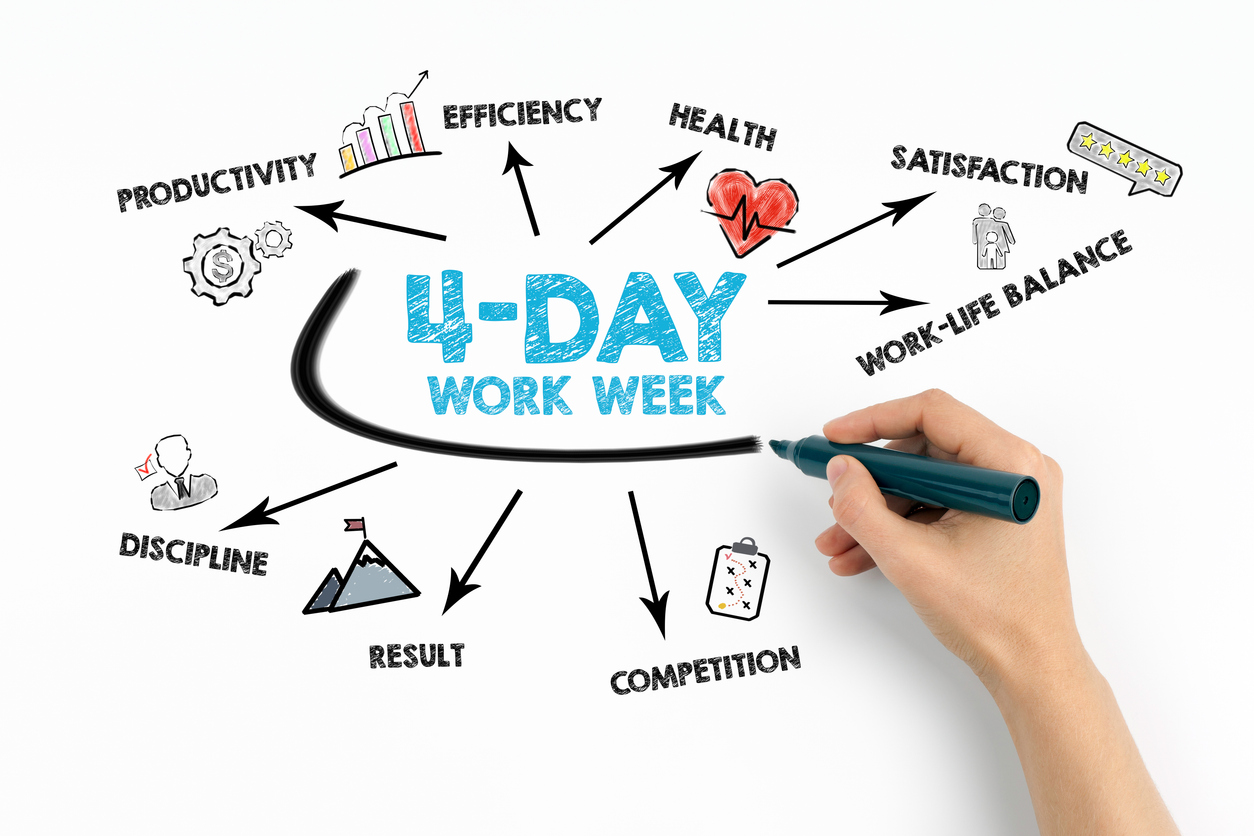Has the 4-day week made an impact on your workplace yet? If not, it’s probably inevitable that it will.
Employees, now consumers of the workplace, have made it plain that shorter work hours make a job – and the organization that provides it – a far more attractive prospect.
What’s the up side to the 4 day week?
Research backs up the rise and rise of the 4-day week. In recent trials involving 3,000 workers, over 70% of people reported feeling happier and less burned out.
Technology is gearing up to play a big role. For example, research firm Autonomy calculates that use of AI will see 88% of UK workers and 71% in the US reduce their hours by a tenth.
The outputs from these efforts are meaningful. Employees who enjoy 4-day weeks work better and feel more commitment to their employer. Companies that provide seamless, supportive working conditions where engagement is at a premium are more likely to retain and recruit the best talent.
Of course – no trend is ever beneficial across the board. Trials around the world have revealed a highly important factor: when implementing reduced working hours, you must empower your strategy with knowledge, not control.
- Did the 4-day week improve wellbeing in general? Definitely.
- Did it improve productivity? Yes, in many cases, and also resulted in more environmental working.
- Were workers happier with their work-life balance? Also a resounding yes. In general, it’s a big win for the ESG agenda.
But here’s why you need to draw up your strategy carefully
Truth be told, the experiment didn’t work quite the same for everyone. For example, one engineering supplies company felt employees had swapped 10 normal days for 9 hectic ones at their warehouse and manufacturing centres. They abandoned the project in these types of location.
Other organizations with mixed-role workforces found it a logistical nightmare to create equal practices for their entire workforce. A citizen’s advice bureau found it impossible to make the strategy work in its help centre, which had set opening times, but saw it could be implemented on the admin side. A decision was made to un-do the trial, as no fair compromise could be devised.
So when considering implementing shorter working hours, flexibility is the key. Many organizations are adapting the initial idea to suit their own business and employees – maybe shorter days rather than fewer days, or choice of which day people take off rather than mandated long weekends.
And that’s where knowledge comes dramatically into play.
Today’s most savvy workplace leaders already know that one size never fits all when it comes to hybrid working. We’ve seen the most successful companies bend and flex and create their own playbook when it comes to satisfying the human needs and operational requirements of their business.
But where does that knowledge base come from? Not from guesswork, although managers’ instincts will always be invaluable. These days, advanced workplace management software not only provides effortless space scheduling but also the solid data on which sound decisions and good plans can be made, thanks to integration with sensors and other technologies.
The workplace platform reveals in real time how workers are really using their workspace, and how it should adapt to meet those needs. It also integrates with AI and automation to relieve the burden of tedious or repetitive tasks – and rather than replacing the human, it provides the time for all-important thought and emotion.

Evolving the digital workplace
It’s been noted that workplace leaders are now reviewing and amending hybrid working practices that were put hastily into place when working from home became pandemic-mandated.
They are taking the best from those practices and incorporating the latest in workplace technology, which has evolved hugely to accommodate and enhance the modern way of working.
Rendezvous Workspace by NFS Technology, for example, has introduced innovations ranging from colleague search – so staff can find the people they need for collaboration and book desks or rooms near them via a mobile app – to an employee portal with Teams integration where workers and managers can block out space for teamworking and discover who’s where.
Many workplaces still have lots of adapting to do. Gartner’s latest research paper (Gartner – Predicts 2024: Generative AI, Hybrid Work and the Four-Day Work Week) comments that end-user services still often fail to meet new ways of working and improving digital employee experience due to siloed organizational structures.
The paper argues that traditional staffing focuses too much on technical skills, neglecting the new capabilities required for the digital workplace, leading to increased attrition rates – the last thing workplace leaders need.
And it says that immature end-user service structures hamper new technology adoption, such as Microsoft 365 Copilot, due to poor collaboration with key IT, business, and vendor stakeholders.
Industry-watcher Luis De Souza, CEO of NFS Technology, agrees with the recommendations put forward by Gartner for to support the governance and development of healthy digital workplaces.
“As Gartner urges, organizations need to invest in evolving from end-user services to a unified digital workplace organization, ” he says.
“There’s a need to create new roles such as digital workplace leaders and digital employee experience (DEX) engineers, and to define engagement models between I&O leaders and other IT teams, business units and technology vendors.”
Importantly, Luis says, workplace leaders must develop a human-centric enablement mindset focused on improving DEX maturity, evolving services, upskilling staff and changing culture.
Why it pays to sharpen your workplace knowledge
Luis says: “As Abraham Lincoln once said: “Give me six hours to chop down a tree, and I’ll spend the first four sharpening the axe.’
“When you empower your hybrid and AI strategy with knowledge, take action based on real-world data captured and analysed by technology, you are honing and perfecting your workplace practices on a continuous basis.
“The result is a unified digital workplace where improved productivity, wellness and employee engagement go hand in hand with a better work-life balance for everyone.”
Discover more about the Rendezvous Employee Portal

